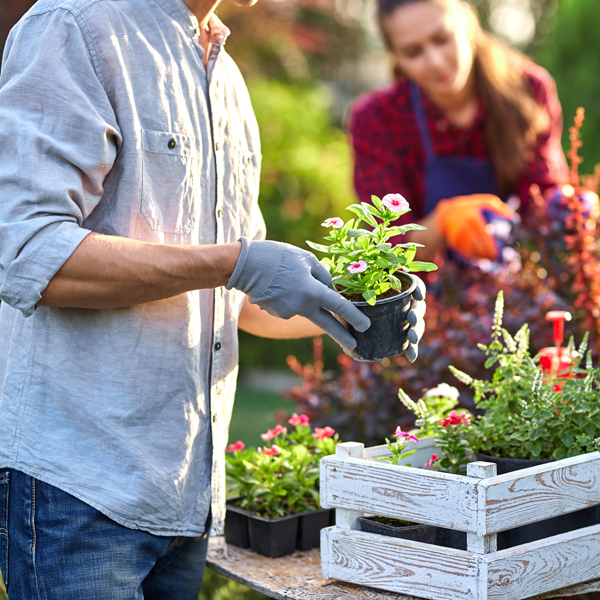The Very Best Gardening Plants for Low-Maintenance and High Award
The Very Best Gardening Plants for Low-Maintenance and High Award
Blog Article
Opening the Conveniences of Horticulture: A Detailed Consider the Different Types and Their Influence On Wellness
Exploring the complex benefits of horticulture exposes a spectrum of techniques that substantially enhance specific well-being. As we check out these diverse horticulture techniques, it becomes obvious that their impact can reverberate on personal, social, and environmental degrees, triggering a closer look at how these links develop a natural narrative of holistic health and wellness.
Sorts Of Horticulture

Flower gardening, another preferred group, stresses the visual allure of grown flowers. This kind can improve landscapes and advertise biodiversity by drawing in beneficial pollinators. Herb horticulture includes expanding fragrant and culinary plants, contributing both to food preparation and all-natural treatments.
Container gardening offers versatility, making it possible for people with restricted space to participate in gardening by using pots and planters. This approach is especially popular in metropolitan setups. Elevated bed horticulture, on the other hand, involves producing elevated stories that boost soil drainage and access, making it much easier for gardeners to manage their plants.
Finally, neighborhood horticulture promotes partnership among people in common spaces, advertising social interaction and cumulative responsibility. Each sort of horticulture serves distinctive purposes and accommodates various preferences, making gardening a functional activity that can be tailored to specific needs and atmospheres.
Mental Health Advantages
Engaging in different kinds of gardening not only generates substantial incentives such as fresh produce and attractive flowers however likewise supplies substantial mental health benefits. Research study suggests that horticulture can be an effective device for reducing tension, stress and anxiety, and anxiety. The act of often tending to plants and growing a yard promotes a sense of function and achievement, which can improve total psychological health.
In addition, horticulture urges mindfulness, as it calls for people to concentrate on the here and now minute, whether it be growing seeds or supporting development. This mindfulness technique can bring about lowered rumination and boosted state of mind security. The exposure to natural surroundings during gardening has also been connected to boosted cognitive operating and lowered sensations of tiredness.
Social interaction plays a critical duty in psychological wellness, and neighborhood horticulture efforts offer opportunities for individuals to attach with others, cultivating a feeling of belonging. The shared experience of gardening can grow relationships and support networks, further bolstering emotional resilience.
Physical Wellness Advantages
Many people may not realize that horticulture likewise provides considerable physical health advantages. Taking part in about his horticulture activities calls for a variety of physical movements, consisting of bending, training, digging, and growing, which jointly add to enhanced strength, adaptability, and endurance. These actions can improve cardio health by advertising a raised heart price, thereby minimizing the danger of cardiovascular disease.
Additionally, gardening can offer as a moderate-intensity workout, assisting individuals accomplish recommended physical task degrees. Studies suggest that regular participation in horticulture can melt substantial calories-- roughly 200-400 calories per hour, relying on the intensity of the jobs carried out. Such calorie expenditure is valuable for weight administration and general metabolic wellness.
In addition, exposure to sunlight during gardening can help with the synthesis of vitamin D, which plays a necessary duty in keeping bone wellness and sustaining immune feature. The act of gardening typically includes working with dirt, which has actually been connected to possible psychological and physical health and wellness benefits due to the presence of advantageous microorganisms.
Social Connections Via Horticulture
The common elements of gardening foster significant social connections among individuals. Community yards, particularly, offer as lively hubs where people from varied histories collaborated, cultivating not just plants however also relationships. These common areas motivate partnership, enabling individuals to trade expertise, skills, and resources, therefore boosting their horticulture experience and fostering a feeling of belonging.
Involvement in horticulture tasks commonly results in the formation of relationships and support networks. Participants frequently unite for usual goals, such as planting periods, harvest events, or instructional workshops, which reinforce interpersonal connections and produce a sense of neighborhood. Such interactions can reduce feelings of isolation and boost psychological health, as people see post find friendship and camaraderie in common ventures.

Ecological Effect of Horticulture
Gardening dramatically contributes to environmental sustainability in numerous methods. One of the most notable advantages is the enhancement of biodiversity. Home gardens provide essential habitats for numerous types, consisting of pollinators such as bees and butterflies, which are vital for ecosystem wellness. By cultivating varied plant species, garden enthusiasts can create a well balanced environment that sustains both flora and fauna.

Moreover, yards play a critical function in water conservation. Tactical landscapes, including indigenous plants and xeriscaping, minimize water usage and protect against overflow, thereby shielding regional rivers from contamination.
Conclusion

The diverse kinds of gardening-- including veggie, flower, natural herb, container, and raised bed-- contribute to psychological and physical health and wellness, foster social links, and advertise ecological sustainability. By engaging in horticulture practices, individuals can experience better high quality of life while additionally supporting neighborhood bonds and ecological health and wellness.
Report this page